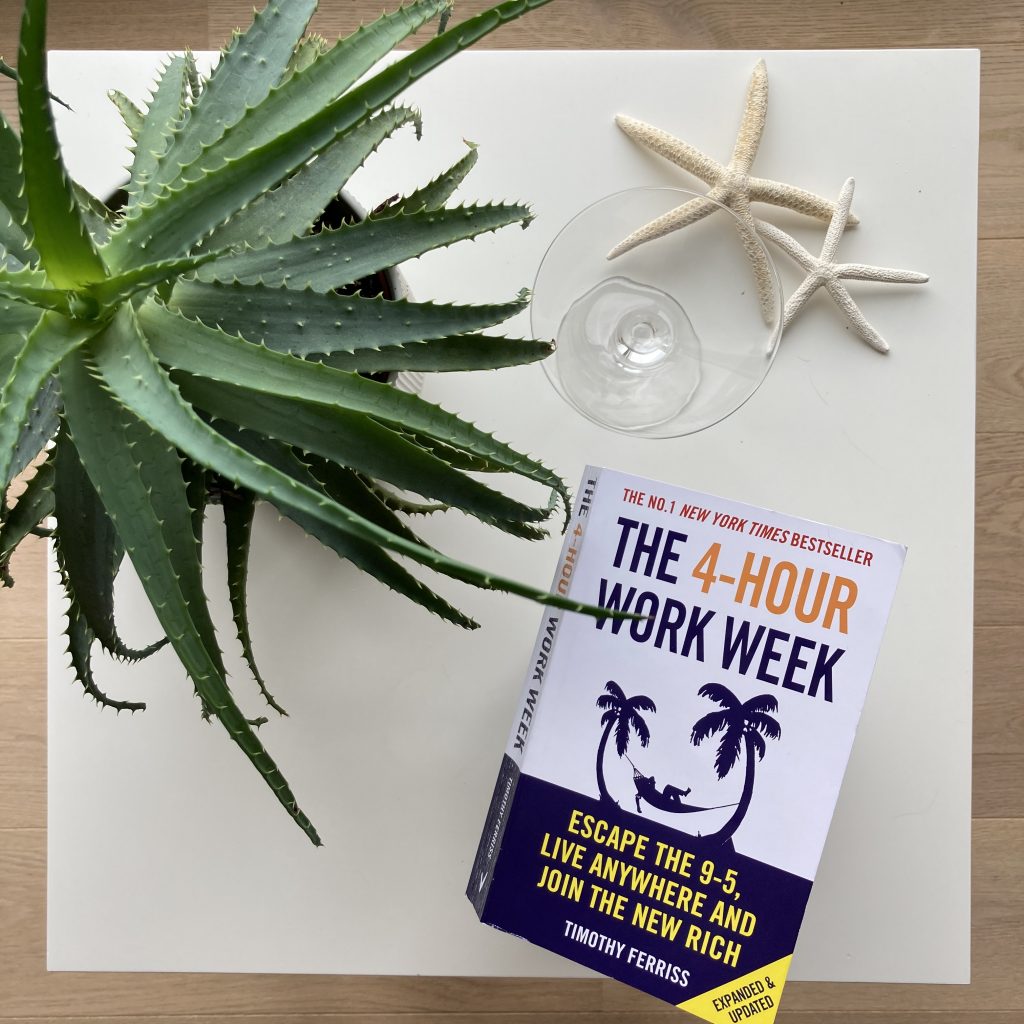the 4-hour work week by tim ferriss has been around for a bit.
first published in 2007 and revised 2011, it isn’t exactly fresh, hot news.
it regularly popped up in different algorithm-driven suggestions, but i always dismissed it based on its title and cover.
i just didn’t buy the promise.
but algorithms can be pesky little things and when i started delving into personal finance more, i just couldn’t ignore it any longer.
so i bought it.
and i guess i bought the dream right with it, because once in my possession, i wanted to like it.
i wanted to like it very, very badly.
and i did.
but also i didn’t.
what the 4-hour work week is about
the book’s premise is lifestyle design. how can you adapt your life (or at least the biggest chunk in your life : your job) to your needs of freedom and independence?
work way less, earn the same (or more) and do with your free time whatever you please.
the dream, right?
or is it?
break the mould
depending on where you live and what society you live in, chances are that 9 to 5 jobs are the standard social model.
it’s what you saw most often growing up. it’s what your parents did, your neighbours and the rest of your entourage did. so, you do it, as do your friends and so forth.
very few societies showcase different models (unless it’s working even more) and it’s hard finding role models doing something different and succeeding.
as the currently salient social model is not for everybody, the idealist in me applauds anything that’s able to do this.
like the 4-hour work week.
it breaks the 9 to 5 mould and introduces something else, something new, an alternative.
once there is an alternative, there is choice and with choice comes reflection and the inevitable line of questioning that starts with what you want and ends with who you are.
dreamlines
the author accounts for this very early in the book with the concept of dreamlines, an exercise guiding you in the process of making choices.
this and other written exercises can be as powerful as they are simple, as psychology demonstrated time and time again.
(see almost anything by pennebaker).
this particular version has the added benefit of breaking dreams down into actionable steps, thereby turning the eerie into something tangible.
the odds aren’t in your favour
reading the book makes the process of finding a side business (called a muse by the author) sound like a walk in the park.
a few hours here, a few hours there and boom you are financially independent.
ok, now i did the exaggerating.
to be fair, the author did go into a lot more very practical detail.
the sentiment, however, remains.
everything is easy, everything is fast, just a few things to take into consideration, but all in all, not that hard.
only that it is hard.
just one small example
the author claims that it takes 1-3 hours to create a more compelling website than the competition (p.181). having recently gone through the process of creating a website myself (you’re reading it), i can tell you that researching other pages with the same objective, writing texts, taking pictures, choosing a cms, hosting, a theme, then wire framing and publishing the pages took a lot more than 3 hours.
hell, researching the difference between wordpress.com and wordpress.org took me longer than an hour.
disclaimer : this site is not supposed to be a muse, so the comparison is apples and oranges.
not everybody might lose themselves in the details quite as much as me, but on the other hand i have an unfair advantage.
i know what a cms is. if you don’t, it will probably take you a LOT longer.
this is just one example, but to me it illustrates my basic problem with the book quite well.
nothing in the book is per se impossible.
however, it’s just not likely.
it’s not even probable.
on the contrary, it takes time, energy, strategy, hard work, discipline, sacrifice and dedication.
evidence?
despite (or maybe because of) the numerous testimonials sprinkled throughout the book, i do wonder about hard proof.
evidence after all is a numbers game.
testimonials and success stories for everything and its contrary are but one google search away.
so i wonder, of all the people successfully implemented the advice in the book, just exactly how many more didn’t or couldn’t?
why the hassle?
for all those who failed or don’t want to put in the work with as unrealistic odds as these, i have good news : you can skip it, because my second problem with the book is what i would refer to as an ‘inconsistency’.
an inconsistency?
according to the author you start with finding out what it is you want, aka the dreamlines.
next, you go through all the hassle and hustle of setting up a side business.
all that to conclude and to warn you in one of the last chapters, that once you went through this strenuous process and left everything familiar behind you, you might feel a void (ya think?) and the need to look for new experiences to fill your new empty life to your liking.
or in other words, you start again at the very beginning.
only that now, after you’ve just worked yourself to the bone and you find yourself in uncharted territory you ask this question from an exhausted and emotionally fragile place.
so, why all the hassle?
why not start the process of getting order in your priorities and your dreams right there with a more exhaustive version of the dreamlines?
of course, it’s easier to think about what you want when you are free and don’t feel the constraints of a 9 to 5 job and yes, it may take longer.
but will it take longer and be more challenging than building a side business you are able to live off of though?
there are definitely things you could do to support you in this endeavour to gain clarity right at the beginning.
at some point (later in the book and for different purposes) the author recommends a good decluttering or a meditation retreat .
i recommend you do this before, during or just after dreamlining.
it may help.
do what you love and you’ll never work a day in your life
if however, you are the kind of person who has the drive to make it through all the steps, i can guarantee you that you are most likely not the person to be satisfied with doing nothing in your life for the rest of your life.
by the way, the author and i agree on this point.
chances therefore are you go back to a working / doing anything at some point.
you will of course choose something you care about.
if you care about it, chances are you will be good at it and if you are good at it, chances are the opportunity to make money off of it might present itself to you sooner than later.
so why not plan for this straight away?
when you have that, when you know what that is (or during the process of finding out what that is, because it may change), use the other chapters to help you find a way to make that happen.
and more of the same
there were other elements i didn’t like about this book :
- the author’s productivity tips that i believe could have used a reference to the people who first came up with them,
- some advice to deceive your employer like calling in sick or outsourcing part of your job to someone doing it for less money than you
- the general use of a mix of techniques aimed at getting what you want at any cost (this blog isn’t called idealist at heart for nothing. for more, see the mission statement.)
as you can see, most of these are a questions of values.
the most dangerous advice however, is, i believe, to rely exclusively on your muse in terms of financial independence.
there is after all a process called ‘arbitrage’.
in economics, this basically means that if you found a way to make money, it won’t take long until the world finds out about it and catches up.
this means that your muse might not be as sustainable in the long run as you would like.
what do you do then?
right, start the hustle (and the hassle) from the very beginning.
who this book is for
this book is for readers who
- are interested in alternative lifestyles or need the inspiration to imagine something beyond a 9 to 5 job,
- want to see what the hype is all about, and
- know about the risks and the odds of financial independence.
feedback
now, it’s up to you.
have you read the 4-hour workweek?
if so, do you agree with my sentiment?
if not, did this review help you to make a choice whether you should read it or not?
please let me know in the comments.
idealistically yours,
the simps















2 Responses
I had written a long comment but lost it :((
But in short thanks a lot for your review, that was super interesting and will save me some money as I was interested in the book, but feared the “starting a business is easy” (no) and an unethical and egoistic approach. I’m still in to break that 9/5 system though haha
Very happy I found your blog, thanks for the read and keep up the good work!
thank you so much for your kind words and so sorry about your first long comment that you lost.
if you’re interested in breaking the 9 to 5, may i recommend vicki robin’s ‘your money or your life’? i liked it a lot and will post a more comprehensive review in the next weeks, you can find already find a sneak preview on my instagram.
best,
the simps